Words for mead, wine and related things in Celtic languages.
Words marked with a * are reconstructions.
| Proto-Celtic | *medu = mead, wine, alcoholic drink *medwos = drunk |
|---|---|
| Celtiberian | Mezu-kenos = personal name “mead-born” |
| Gaulish | medu = mead Medu-genos = personal name “mead-born” |
| Primitive Irish | medu = mead |
| Primitive Irish | *ᚋᚓᚇᚒ (*medu) = mead ᚋᚓᚇᚇᚑᚌᚓᚅᚔ (meddogeni) = personal name “mead-born” ᚋᚓᚇᚃᚃᚔ (medvvi) = personal name “meady” |
| Old Irish (Goídelc) | mid [mʲið] = mead Midgen = personal name “mead-born” |
| Middle Irish (Gaoidhealg) | mid, midh = mead medb = strong, intoxicating (liquor) |
| Irish (Gaeilge) | meá [mʲæh / mʲa(h)] = mead |
| Scottish Gaelic (Gàidhlig) | meadh [mjɤɣ] = mead meadhach = fuddled with mead, like mead, abounding in mead |
| Manx (Gaelg) | meddagh = mead-maker |
| Proto-Brythonic | *með [mɛːð] = mead |
| Old Welsh (Kembraec) | med = mead |
| Middle Welsh (Kymraec) | met, med = mead meddawt, meddavt, meddwdod = drunkenness, inebriation, intoxication meddfaeth, metveith, meduaeth, medweith = nourished on mead, having feastedon mead, mead-feast medgell, meddgell = mead-cellar, drink-cellar met kirn, medgyrn, metgyrn, meddgyrn = mead-horn, drinking-horn metv, medw, meddw = drunk medwyt, medwi, meddwi [ˈmɛðwi] = to get drunk |
| Welsh (Cymraeg) | medd [meːð] = mead meddaidd = like mead, sweet medd-dod, meddwdod = drunkenness, inebriation, intoxication meddfaeth = luxurious, soft, gentle, delicate, pampered, effeminate meddw [ˈmɛðu] = drunk, intoxicated, fuddled, tipsy meddwi [ˈmɛðwi] = to be(come) drunk or tipsy, to be intoxicated or inebriated, to make drunky |
| Middle Cornish (Cernewec) | medh, medu, meddou = mead medhas = drunkenness, intoxication medho = drunken, intoxicated |
| Cornish (Kernewek) | medh = mead, hydromel medhow = drunk, intoxicated medhwenep = drunkenness, intoxication medhwi = to intoxicate, make drunk medhwynsi = drunkenness |
| Old Breton (Brethonoc) | medot = mead |
| Middle Breton (Brezonec) | mez = mead |
| Breton (Brezhoneg) | mez [meː(s)] = mead mezv [mɛ(z)w] = drunk, wobbly (furniture) mezventi = alcoholism mezvier = drunkard mezvierezh = drunkenness mezviñ [ˈmɛ(z)vĩ] = to get drunk mezvus [ˈmɛ(z)vys] = intoxicating, heady |
Etymology: from PIE *médʰu (honey, honey wine, mead), possibly related to Proto-Semitic *mataḳ- (sweet) [source].
Words from the same roots include mead in English, mead in English, mjöður (mead) in Icelandic, медведь [mʲɪdˈvʲetʲ] (bear, large clumsy person, lit. “honey eater”) in Russian, mesi (nectar) in Finnish, and possibly 蜜 (mì / mitsu – honey) in Chinese and Japanese and 밀 (mil – beeswax, honey) in Korean [source].
The Irish name Méabh (Maeve) also comes from the same roots [source].
| Proto-Celtic | *wīnom = wine |
|---|---|
| Leptonic | 𐌖𐌉𐌍𐌏𐌌 (uinom) = wine |
| Old Irish (Goídelc) | fín = wine fín acat = vinegar |
| Middle Irish (Gaoidhealg) | fín = wine fínán = cheap wine fínda = pertaining to wine fínmar = having abundance of wine fíntan = vineyard |
| Irish (Gaeilge) | fíon [fʲiːn̪ˠ] = wine fíonchaor = grape fíoncheannaí = wine merchant, vintner fíonda = vinous, pertaining to wine fíondaite = wine-coloured fíonghort [ˈfʲiːnˠˌɣɔɾˠtˠ] = vineyard fíonmhar = rich in wine, vinous fíonsaothrú = viticulture |
| Scottish Gaelic (Gàidhlig) | fìon [fiən] = wine fìon-chaor [fiən xɯːr] = grape fìon-chrann = grapevine fìon-fhoghar = wine harvest, vintage fìon-geur = vinegar fìon-lios = vineyard fìonadair = wine-maker |
| Manx (Gaelg) | feeyn = wine feeyney = of wine, vinous feeyneyder = wine-maker, vintner feeyneydys = viticulture berrish-feeyney = grape feeyn geayr = vinegar fouyr feeyney = vintage garey feeyney = vineyard |
| Proto-Brythonic | *gwin = wine |
| Old Welsh (Kembraec) | guin = wine |
| Middle Welsh (Kymraec) | gvin, guin, gwin = wine gwinblas = mansion where wine is dispensed in abundance gwindeveirn = wine-tavern gwindy, gwin-dŷ = wine-house, wine-tavern, wine-cellar, banqueting house guinegyr, gwinegyr = vinegar guinlann, gwinllan(n) = vineyard, vine |
| Welsh (Cymraeg) | gwin [ɡwiːn] = wine, fermented liquor made from the juice of fruits (apples, elderberries, rhubarb, gooseberries, etc), like wine, pleasant, sweet, fine, excellent gwinbren = vine gwindy = wine-house, wine-tavern, wine-cellar, banqueting house gwinegr = vinegar gwinllan = vineyard, vine, copse, grove, wood, plantation gwinwr, gwinydd = vintner, vine-grower, vine-dresser, vineyard owner |
| Middle Cornish (Cernewec) | gwin, guin = wine gwinbren, guinbren = vine |
| Cornish (Kernewek) | gwin [ɡwiːn] = wine gwinbren = vine gwinlan = vineyard gwinyer = winemaker |
| Old Breton (Brethonoc) | guin = wine guiniin = vines |
| Middle Breton (Brezonec) | guin, guyn = wine guiny, guyni = vines guynieyer = vineyard |
| Breton (Brezhoneg) | gwin [ɡwĩːn / ɡɥĩːn] = wine gwinegr [ɡwĩnˈɛk(r)] = vinegar gwini [ˈɡɥĩːni] = vines gwinieg [ɡɥĩ.ˈniː.ɛk] = vineyard gwinier [ɡwĩ.ˈniː.ɛr / ɡɥĩ.ˈniː.ɛr] = winemaker gwinioniezh [ɡɥĩ.nɔ̃ˈniː.ɛs] = oenology |
Etymology: from Latin vīnum (wine, grapes, grapevine), from Proto-Italic *wīnom (wine), from Proto-Indo-European *wóyh₁nom (wine, vine). The Welsh and Cornish words come from Latin via Proto-Celtic, the Breton and Goidelic words were borrowed direct from Latin, and the Leptonic word comes direct from Proto-Italic [source].
Words from the same roots include wine, vine, vinegar and oenology (the scientific study of wines and winemaking) in English, wijn (wine) in Dutch, vino (wine) in Italian, wino (wine) in Polish, and possibly ወይን (wäyn – grape) in Amharic [source].
Sources: Wiktionary, Am Faclair Beag, Online Manx Dictionary, Teanglann.ie, eDIL – Electronic Dictionary of the Irish Language, In Dúil Bélrai English – Old Irish glossary, Geiriadur Prifysgol Cymru, Gerlyver Kernewek, Dictionaire Favereau, TermOfis, English – ProtoCeltic WordList (PDF), Etymological Dictionary Of Proto Celtic















